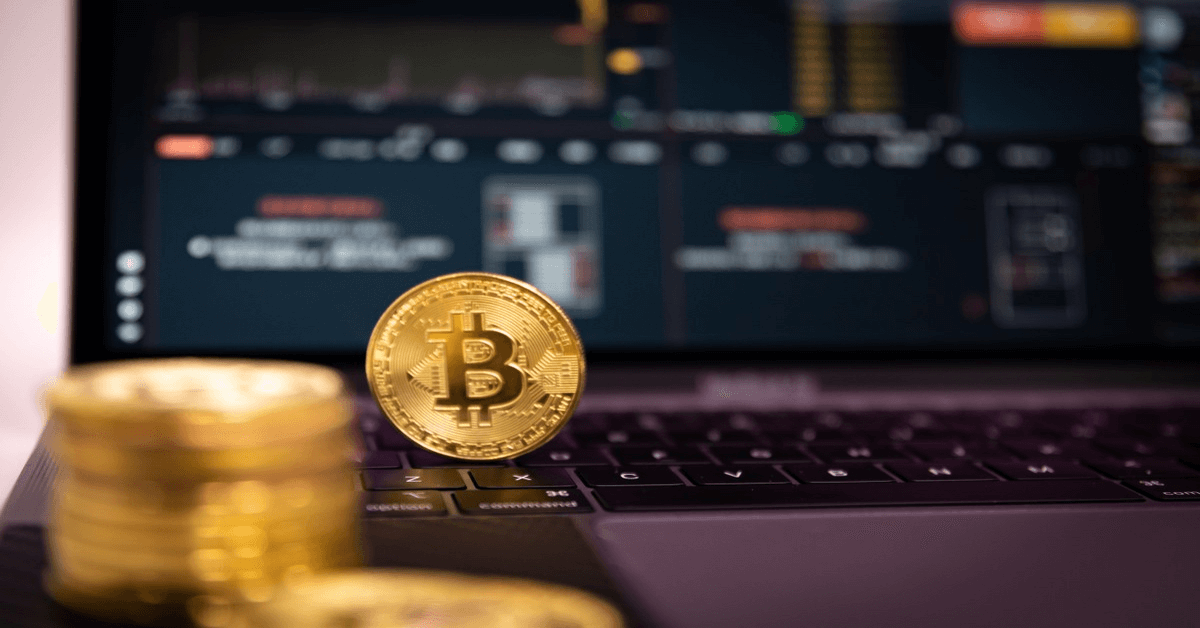Most of the obscurity of the legal status of digital currencies is attributable to the fact that relative to more conventional currency and payment mechanisms, space has only lately become common. Below, we will discuss some of the emerging legal ramifications of engaging in cryptocurrencies.
What Are Risks with Investing in Bitcoin?
Bitcoin is the most popular cryptocurrency today by far, but like every modern frontier, certain challenges are expected to occur. Despite bitcoin’s recent success, when it comes to investing in bitcoin, there are several significant risks. Let’s learn how to invest safely and avoid scams.
1.The High Level of Volatility
The bitcoin price is continuously pulsating back and forth. In such a volatile market, whether you will get a return on your money, there is no knowing. Maintain a vigilant watch on the market to prevent a major loss. Create minor investments in the long run, as they’ll be more valuable.
Cryptocurrencies have gone on some crazy rides in the past with major price fluctuations. Investors who have seen unexplained and unparalleled rises and losses over the past decade have been fascinated and puzzled by epic booms, busts, huge fluctuations, and fraud.
Crypto-price uncertainty typically derives from three major sources: sentiment, speculation, and market manipulation. Combined with the vulnerability of digital currencies and other crypto assets to opinion, emotion, and advertising, it is the uncontrolled and opaque existence of digital asset markets that renders values unpredictable.
Prices may be rigged by crypto exchanges, media operators, and powerful investors. It seems that this exploitation is common but not yet generally proven. Wash selling, dark pool mining, and shilling are the most used fraud techniques. It should be remembered that the idea of cryptocurrency is revolutionary on its own. There is no past evidence and knowledge that helps you to determine how much you can trust it. Bitcoin is still under production, as are other virtual currencies.

Therefore, something unforeseen may happen to it, which inevitably happens not only to economic artifacts but also to new technology at the growth stage. However, it is less “experimental” than its equivalents, becoming the most widely used cryptocurrency. Furthermore, its amount can be assessed as high compared to conventional assets since this asset is not meant for cautious investors.
In the short term, Bitcoin cost increases are volatile, which further adds to this asset’s perceived risk. Based on data from the outside world, financial analysts may forecast the value of actual currencies or stock quotes more or less precisely. But it’s almost impossible to guess just how much Cryptocurrency will cost overnight.
The huge volumes of exchange trade, the convergence of Bitcoin with different firms, legislative initiatives of governing agencies, and many other, often overlooked phenomena are causes that affect the fluctuations of the valuation of the cryptocurrency. You should consult with blockchain firms to recruit blockchain developers to invest in blockchain technologies.
There is a strong degree of doubt over the emerging existence of currencies. Speculators looking to benefit from the short-term or long-term ownership of digital currency have created a significant trade activity on digital sites.
Virtual currencies are not funded by a banking system, a national or foreign entity, reserves, or other loans, and the valuation of digital currencies is solely calculated by the value put on them by market investors through their purchases, which means that lack of faith can lead to a breakdown of market practices and an unexpected decrease in value.
As the currency exchanges only on demand, the business uncertainties are esoteric. There is a limited amount of exchange, which ensures that supply considerations can be influenced, and restricted control can make it vulnerable to market manipulation. Besides, the currency can look more unpredictable than other traditional money, fueled by speculative demand and aggravated by hoarding, provided its restricted adoption and lack of alternatives.
2.The Lack of Concrete Regulations
A lack of legal structures means that market fluctuations and exploitation remain extremely unpredictable. Investors and developers are still worried about the prospect of potential sanctions, which may have a huge effect on the appeal of cryptocurrencies or potentially end up restricting them completely.
Crypto rules are dynamic, disjointed, and disorganized. Tax treatment is one area of special interest for taxpayers. A lack of oversight or what others term as regulatory greyness suggests that some investors are afraid of investment because they have no good idea of what tax commitments need consideration or what documents need to be maintained.
The good thing is that it’s catching up with regulators. Authorities are taking action in many countries, publishing academic articles, norms, and implementing new legislation. One of the first countries to launch the development of a comprehensive regulatory system is Switzerland. Via ‘sandboxes,’ the nation has suggested a concept to minimize regulations while also holding enterprises in line with regulation, enabling startups to explore and develop within regulated conditions.
There are a number of approaches to controlling Bitcoin, depending on the region. The lack of a well-thought-out coherent cryptocurrency governance structure just raises the ambiguity factor about their potential. The use of Bitcoin for gambling, financial fraud, illicit dealing, and other criminal financial activities scares enforcement officials in many countries.
Around the same time, with the emergence of the popularity of digital currencies, political mechanisms are starting to aggressively come up with different legislative proposals that control Bitcoin turnover and other related currencies in one form or another. The bitcoin industry is currently functioning without any big regulations. The government has no strong view of cryptocurrencies; the industry is far too fresh. It is not taxable, which as an investing tool will make it attractive.
A lack of taxes may, however, lead to issues if bitcoin is presented as a rivalry for government currency. Digital currency is not generally known as of yet, but the outlook is constantly changing. There’s no way to predict what the status of the bitcoin economy will be in a couple of years.
This field is significantly less evident for firms working in the crypto industry due to the dynamic and changing regulatory status of digital currency. For instance, businesses that only accept crypto-currencies cannot need to file or receive licensing at all. On the other hand, depending on their jurisdiction, they will be forced to adhere to additional protections.
Any country may prohibit the use of cryptocurrency or may state that transactions violate anti-money laundering legislation, considering the global consequences. A single AML solution does not exist because of the difficulty and dispersed existence of Bitcoin and a large number of participants: senders, recipients (possibly launderers), servers (commodities trading systems), payment processors.
3.The Doom of Cybertheft
Digital currency, which leaves this commitment vulnerable to cyber threats, is technology-based. Hacking is a significant possibility, as the missing or stolen bitcoins will not be recovered. Some studies show that many consumers are losing their savings in trading and mining losses.
Exchanges are more likely to be exploited — even though a smart wallet is secured. Additionally, there is hardly a way to recover your coins if you have a wallet and you lose or misplace your card. To make sure you have the most secure alternative, carefully study your cryptocurrency assets.
If the intruder has access to the confidential, secret key of the user, he will take all of the digital wallet’s inventory. There are occasions where, among Bitcoin users, they have lost access to hidden keys owing to their own confusion or tragic coincidence – and therefore, to their own Cryptocurrencies.
In reality, a bitcoin is merely a hidden number. An individual must verify a scheduled exchange with a secret encryption key to pass a bitcoin. But the intruder will snatch the bitcoin if the confidential key is compromised.
Bitcoin accounts do not report details on who owns the money. However, looted funds are also hard to turn into fiat currency. To conform to anti-money laundering laws, brokers normally have specific identity criteria for account holders. It is impossible to unexpectedly cash out a huge amount of stolen bitcoins from a closely monitored bitcoin address at a trustworthy exchange.
To make matters worse, taxpayers cannot reclaim funds that are lost or robbed, and it is difficult to undo erroneous transactions. In addition, cryptocurrencies do not have official protections or protection, unlike standard deposits through a bank or brokerage. Discounts on missed assets depend on the desire of the business you’re working with at the moment.
4.The Increasing Number of Frauds
The Bureau of Consumer Financial Protection has cautioned against these trades in which unsuspecting customers in illegal markets are duped out of their bitcoins. For investors, this lack of protection poses a major risk. Although mechanisms have been developed to deal with these concerns, safety remains a major concern.
An unwelcome fact – no consumer security is offered by Bitcoin. It is not possible to reverse a flawless deal. In a botched deal, all that remains is to continue to force the collector of funds to refund them willingly.
This is due to the fact that, unlike bank cards, there is no intermediary guardian. Bitcoin transfers are analogous to standard cash transactions, in which only two parties are involved. The property of the irrevocability of transfers in itself, however, has little bearing on the dangers of trading as an asset in Bitcoin. The investor must also be aware of this risk.
Cryptocurrencies are commonly believed to provide criminal groups with a new way to conduct bribery, financial fraud, and a host of other criminal activities. Many blockchain holders who do not wish to use this modern technology to commit those crimes will not specifically be affected by this. Investors who are in the unfortunate situation of becoming a victim of financial crime, though, are unlikely to have the same legal remedies as typical victims of fraud.
5.The Hidden Curse of Decentralization
A possible major risk for an individual investor is indeed one of the major attractions of many digital currencies. Since it is decentralized, Bitcoin (BTC) also opened the way for other cryptocurrencies, implying that it has a little physical appearance and is not sponsored by a central body.
Although governments around the world have stepped in to demonstrate their legislative authority in different ways, BTC and other such digital currencies remain unattached to any authority or entity. This frees stakeholders, on the one hand, from being responsible to those organizations. However, this position, on the other hand, may lead to legal implications.
The valuation of digital currencies relies solely on the value assigned to them by other owners and investors; this is applicable for all currencies, whether digital or fiat. If problems with transfers of ownership occur, consumers can be left in limbo without a centralized government backing the validity of a digital currency.
As a consequence of their decentralized status, another concern associated with cryptocurrencies has to do with transfer specifics. Currency with a tangible appearance switches hands in most other trades. A trusted brokerage firm is interested in making and settling investments and debt lawsuits in the case of electronic currency. Access to money found in an account will almost surely not be recovered if the “keys” to an account are misplaced or stolen, and therefore removed from the user.
6.The Confusing Status of Cryptocurrencies
For any cryptocurrency trader, among the most significant constitutional concerns has to do with the way regional governments interpret cryptocurrency holdings. The IRS has classified bitcoins as property in the U.S. rather than as proper currencies. This suggests that when it comes to disclosing their bitcoin expenditures and earnings on their taxable tax statements, private owners are answerable to capital gains tax rules, irrespective of where they bought digital coins.
For U.S. taxpayers, this part of the cryptocurrency space introduces levels of mystery and ambiguity, but the challenge does not stop there. Indeed, it is unclear if digital currency holders who have obtained their foreign exchange assets will be faced with extra reporting measures as taxation time comes.
Those with more than $10,000 overseas typically have to fill out the International Bank and Financial Accounts (FBAR) Form with the Treasury Department each year, according to a report by CNBC. Another statute, the Foreign Account Tax Compliance Act, or FATCA, mandates that some U.S. taxpayers when filing their taxes with the IRS, identify their foreign accounts on Form 8938.
Former federal tax attorney Kevin F. Sweeney gave a clue as to how international cryptocurrency exchanges could exacerbate U.S. digital currency investors’ tax issues. “There probably is an FBAR requirement, but I wouldn’t go as far as to say that there always is one,” he clarified, noting that the lack of clarification from the IRS has produced a “black hole” of shareholder confusion and tax professionalism. Warren Buffet the greatest stocks investor of all time still against Bitcoin and claimed it’s will be the biggest scam of history even the recent records
It would be incredibly unjust if they expected taxpayers to know that—and then impose fines on taxpayers who did not do that—when professionals cannot even find out 100 percent if there is an FBAR requirement, “It would seem terribly unreasonable if they would assume taxpayers to know that—and to then impose fines for taxpayers who didn’t do that—when professionals can’t even 100 percent figure out if there’s an FBAR requirement,” That will be extremely unfair.
All of this means that when it comes to disclosing cryptocurrency gains and expenses, digital currency holders can take extra care and obey the recommendations of tax practitioners. Since the laws are continually changing, it is now conceivable that what could have been legally acceptable last year or even months earlier could trigger legal concern.
7.The Dependence Upon Technology
Bitcoin is a technology-reliant online currency. Coins are mined online, traded through a smart wallet, and tracked using different systems. Cryptocurrency is worth zero without technology. There is no tangible leverage to back it up, unlike most types of currency or investment.
You own anything that can be traded using cash, real estate, shares, or mutual funds. With a 100 percent technology-based asset, bitcoin holders are more susceptible to cyber-attacks, internet theft, and a lockout method.
The engineering aspect often evolves very rapidly, and sometimes even incoherently. Any consumer knows that a large number of rivals already exist – and continue to emerge almost regularly – for Bitcoin.
Despite the value of brand exposure and massive venture capital investments, in the context of the possible emergence of a more mature cryptocurrency, there is a real technical danger to other cryptocurrencies. The moment that their virtual assets lose their tangible value, stakeholders will clearly not recognize them.
As an instance of some of the technical shortcomings of cryptocurrencies, there have been several studies on the computational cost and energy usage of mining bitcoin. This calculation complexity will also function in the opposite direction and pose possible threats to the investment market under the basis that dynamic processes malfunction in complex ways.
It is true that the decentralized function of true blockchain systems then offers an intrinsic catastrophe and risk-proofing that centralized databases do not enjoy (which are actual honey pots, as demonstrated by the huge breach of Equifax). Not all virtual currencies or keys, though, travel on identical tracks.
8.The Narrow Exit
It is accurate that certain facets in finance have been decentralized with the emergence of bitcoin and its ilk of cryptocurrency, of which there are more than 1,600 and which have been digitally minted.
This shortened barrier to entry provides a vast entrance and a very narrow exit, which can lead to unintended harm as individuals scramble to get out, as is sure to happen in the real world during Black Friday shopping sprees, for example. Due to technical limits, currency inconvertibility, and few market participants with whom to exchange, the escape may be blocked.
Although the asset class is typically uncorrelated to the conventional economy, it is associated with itself, which can cause panic and runs on the market.
9.The Illiquidity of Cryptocurrencies
The real miracle of blockchain-based cryptocurrencies, such as bitcoin, is that without any regulator, such as a bank or banker, the problem of double counting is overcome. This attribute is captured by the idea of digital individuality, where only one representation of an asset can be effective and one of the key reasons this asset class has flourished.
However, their convertibility and insurability are hampered by the intangible and illiquid existence of digital currencies (combined with the argument above on narrow exits). Indeed, the bulk of crypto-assets and crypto-companies are either under-insured or denied coverage by today’s criteria, despite evidence of increasing insurer involvement in the market.
10.The Mark to Market Factor
When crypto investors tend to leave the class of intangible assets that return to fiat currencies or other resources that are mostly loathed by many crypto purists, their escape to protection or liquidity more often brings them to the greenback or the U.S. As buyers told by their “animal spirits” that want in on a betting wave have a desire to pay at a stated valuation or peg, while the market pegs operate well on the way into digital currencies.
However, on the way out, this mark-to-market aspect leaves many buyers exposed to downward pricing pressure, which illustrates the negative consequences of illiquidity, restricted exits, and small asset class involvement.
As more institutional funds enter the room and more exchanges and exchange channels open, these kinds of challenges are being resolved. Meanwhile, market participants will be prudent to consider the inconvertibility of currencies and the unsystematic risk of digital currencies, causing high-frequency investors to turn and run.
To fully grasp the promise of blockchain needs the suspension of unbelief. The abandonment of the conventional economic standard includes the actual capturing of the investing thesis of digital currencies.
What Do We Have to Say?
The future of virtual currencies looks exciting so far. However, even the most experienced buyers remain tentative when the rate declines suddenly. It is a very dangerous endeavor to invest in Bitcoin nowadays. Minimum sustainability or, at least, break-even contributions are not assured.
If you are a BTC holder and like easy profits, our team compiled a list of the best bitcoin casinos that are licensed in the U.S to take your gambling experience to the next level.










